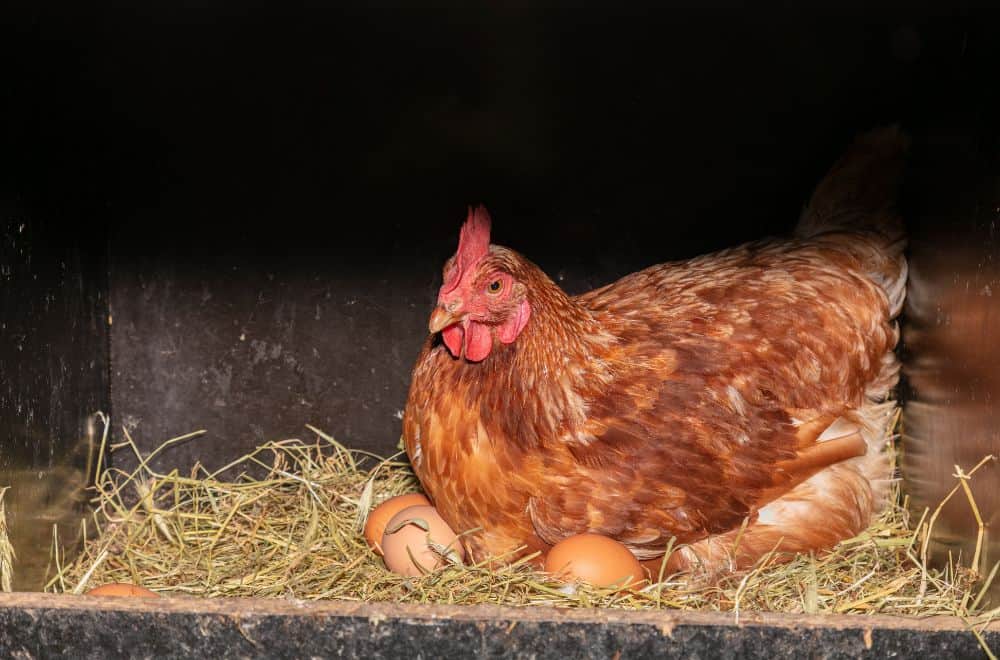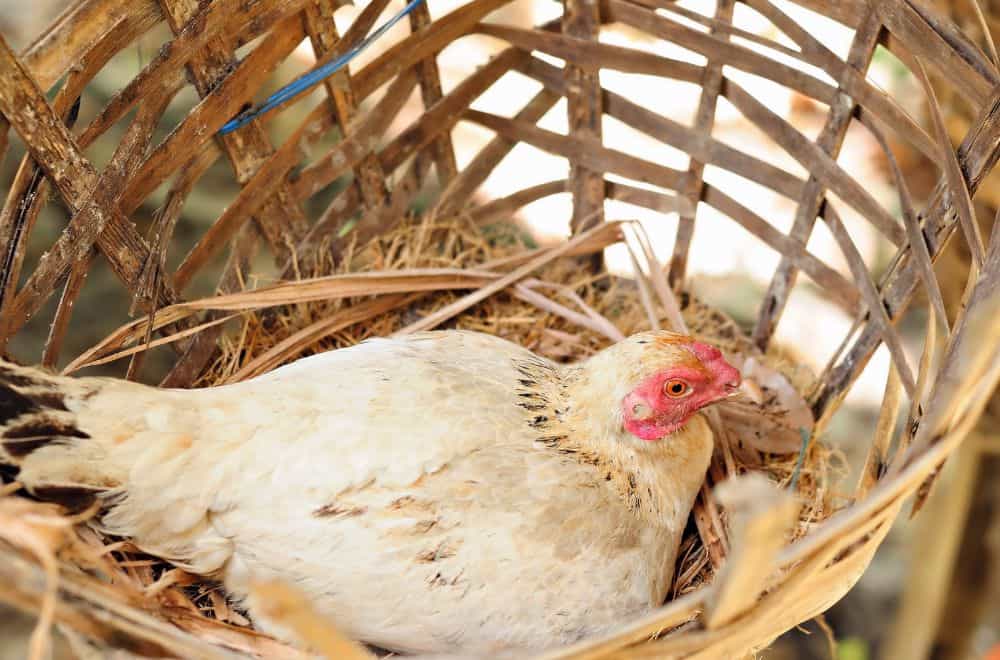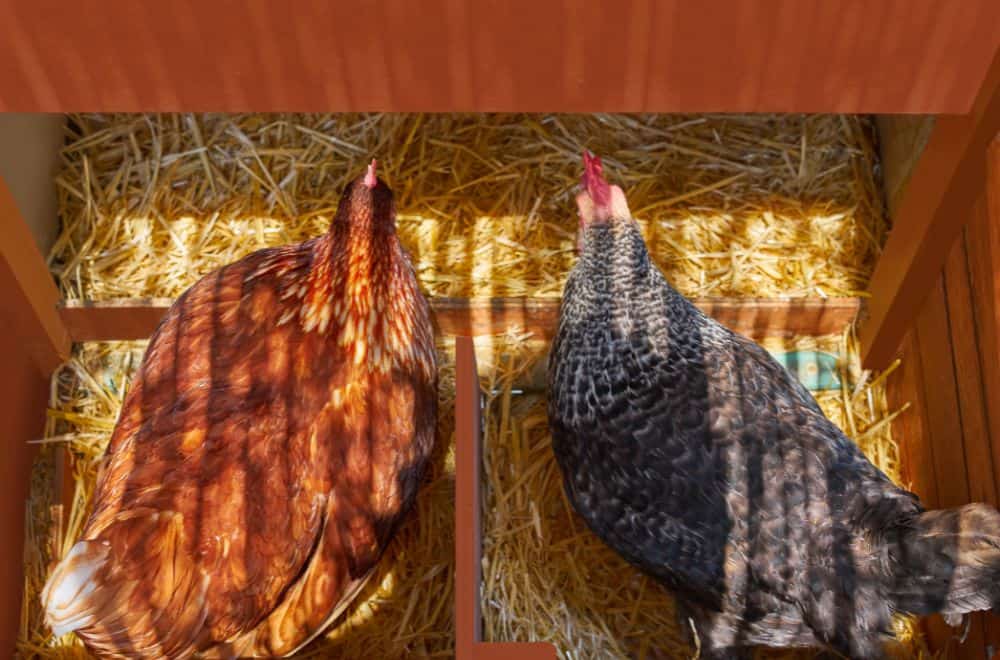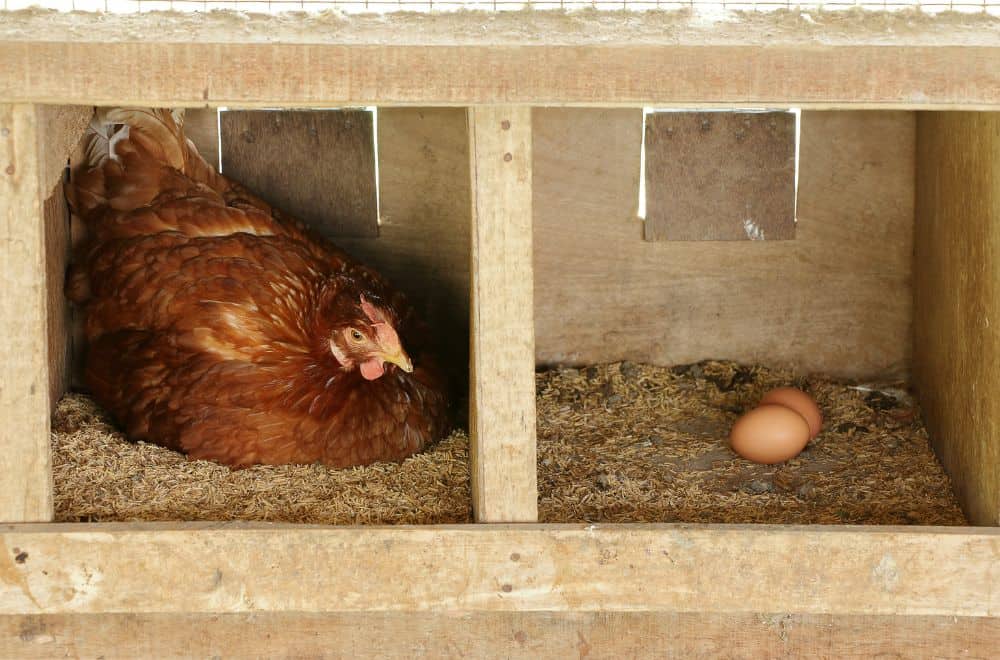Farmers know that only timely collecting eggs prevents chickens from breaking a shell and eating them. Since most hens finish egg laying by roughly 10 AM, you should collect eggs from a coop as soon as possible.
Determining why do chickens eat their eggs can be challenging, but it is crucial to find a way to immediately stop this bad habit. Once they accept eggs as food, doing that can become challenging. So, pay attention to prevention and provide cozy nesting boxes and enough space in the coop to avoid such behavior.
Reasons for egg eating and ways to stop it |
|
| Common reasons | Ways to stop the habit |
| Nutritional deficiency | Offer well-balanced, protein-rich feed |
| Broken eggs | Collect eggs a few times a day and remove broken eggs |
| Weak eggshell | Add crushed eggshells or oyster shells to hens’ daily diet |
| Overcrowding | Provide enough space and nesting boxes in the coop |
| Boredom | Provide entertainment |
| Stress | Provide a quiet, comfortable, and safe environment |
Reasons Why Chickens Eat Their Eggs
Sometimes, chickens start eating eggs, negatively affecting your business as a farmer. Whether it happened by mistake or for some other reason, your primary goal is to stop this harmful behavior from repeating.
Otherwise, you will have an issue with a reduced egg number. Let’s take a look at the most often reasons for eating eggs.
1. Improper and unbalanced diet
When hens have an inappropriate diet lacking protein and with less than 0.14 to 0.18 ounces (4 – 5 g) of calcium daily, they try to make up for it by consuming their own eggs.
Since egg yolk is packed with proteins and the shell is a source of calcium, hens use eggs to regulate the existing nutritional imbalance. Be aware that insufficient access to fresh drinking water can also be one of the reasons for this habit.
2. Overcrowding
When too many chickens live in a crowded place, they develop aggressive behavior. So, you can expect to see broken eggs in the nesting boxes when there are fewer nests than required. Once hens eat the first unbroken egg, they quickly develop a bad habit of regular consumption.
3. A limited number of nesting boxes
Limited nesting box number is one of the primary reasons for chickens altered and unacceptable behavior. If you fail to provide at least one nesting box per four hens, you will soon have a problem with egg eating.
Most boxes are made of wood, plastic, and metal. Sometimes an inadequate nest box material can disturb your hens and become a trigger. There is one more thing! Hens require enough private space, clean bedding, and regular egg collecting to get comfortable conditions for laying.
Without enough free places, two to three hens may try squeezing into the same nesting box, resulting in broken eggs. From then on, it is just a matter of time before you get an egg-eater chicken.
4. Inadequate lighting
Hens prefer dark and private places to lay eggs. So, constant lighting for more than 16 to 17 hours daily is a stressor and a trigger for egg consumption.
5. Boredom
Without appropriate entertainment and enough stimulation, chickens quickly get bored. You can expect such poultry to start stealing eggs. Once they understand how delicious such food is, there is a minimal chance to unlearn such behavior.
6. Curiosity
Chickens are intelligent and curious creatures, so don’t be fooled by the usual underestimation of their abilities. On the contrary, they often curiously explore their surroundings.
Unfortunately, you may particularly face a result of their curiosity during long winter days or when keeping chickens cooped up for a long. In such a situation, young pullets and even cockerels may start pecking at broken eggs only to discover what is happening.
7. Anxiety and stress
Disturbed hens destroy everything around them and often pluck their own feathers when nervous or stressed. So, you can expect to start breaking and consuming eggs at some point, particularly when they need to fight for space in the nesting box.
8. Youth and inexperience
Young and inexperienced pullets often lay first eggs with weak shells, and they usually crack under a slight impact. In such a situation, your chickens may wrongly think broken eggs are food and start consuming them. Only noticing and suppressing the problem in time can stop young egg eaters.
9. Greed
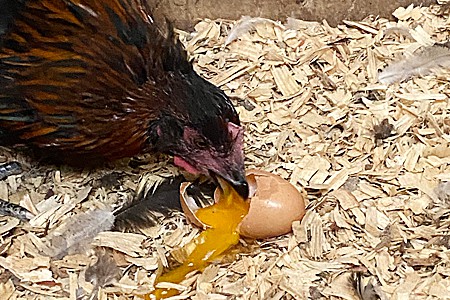
Chickens are omnivorous, meaning they enjoy eating various food, including plants and insects. There is no reason to avoid consuming such yummy food like eggs when they get to it. In most cases, there is a particular reason for such behavior, but sometimes they do it only because being greed.
10. Accidental discovery
When an egg sits in the nesting box for too long, chickens may unintentionally break it at one point. A hen sitting in the nest may try it for curiosity while waiting for an egg to lay and quickly develop a taste for new, unexpected food.
Even though the initial cause was accidental, it will probably become a habit over time. Once the hen gets used to eating eggs, it can be challenging to change that.
Ways to Stop Egg Eating
Most reasons for egg eating are solvable. Be persistent and make a few changes to stop your chickens from using eggs as a treat or vital calcium source.
1. Identify the egg eater
The first step is to identify the egg eater in your flock by checking the noise appearing while a chicken tries to break into the eggshell. Another option is to look for dried yolk on fowl’s bellies, beaks, combs, and plumage.
One excellent but demanding technique is to use a few eggs and make a hole in the shell. Then fill each piece with different colors, mix them with a yolk and egg whites, and arrange eggs in nesting boxes. Finding a chicken with a colored beak will be effortless. Then, isolate it from the flock and try to break the habit.
2. Solve nutritional issues
The problem of an inadequate chicken diet is effortless to solve. It is enough to quickly change it and provide feed with the required 16% to 18% protein. Besides, add some eggshells or oyster shells to provide enough calcium for laying hens and high-quality snacks to keep them full and satisfied.
3. Prevent boredom
The quickest way to solve the problem of boredom is to let chickens roam freely and provide entertainment for your flock. Use ladders and PVC pipes to make a playground and let them climb.
Besides, chickens enjoy stomping a pile of hay or dirt down, so adding it to the coop is beneficial. You can also hang treat balls from the coop ceiling and hide some scratches under the pile to give them something to explore.
4. Provide enough space and nesting boxes
Provide one nesting box per four laying hens. Each should be sizable 1 by 1 foot (30.5 x 30.5 cm), with 2 inches (61 cm) of clean and dry bedding. Place them at 2 feet (61 cm) above the ground.
Remember that hens prefer using the same favorite nesting boxes every time, so avoid relocating them to prevent confusion. Install sloped or rolling-away nest boxes and place small cushions under the nest to hold eggs and prevent them from breaking.
5. Keep the nesting area dark
Provide nest box curtains and some privacy for laying hens. Since light is a trigger for eating eggs, they probably won’t start nibbling them when disabled to see them.
6. Relocate broody hens
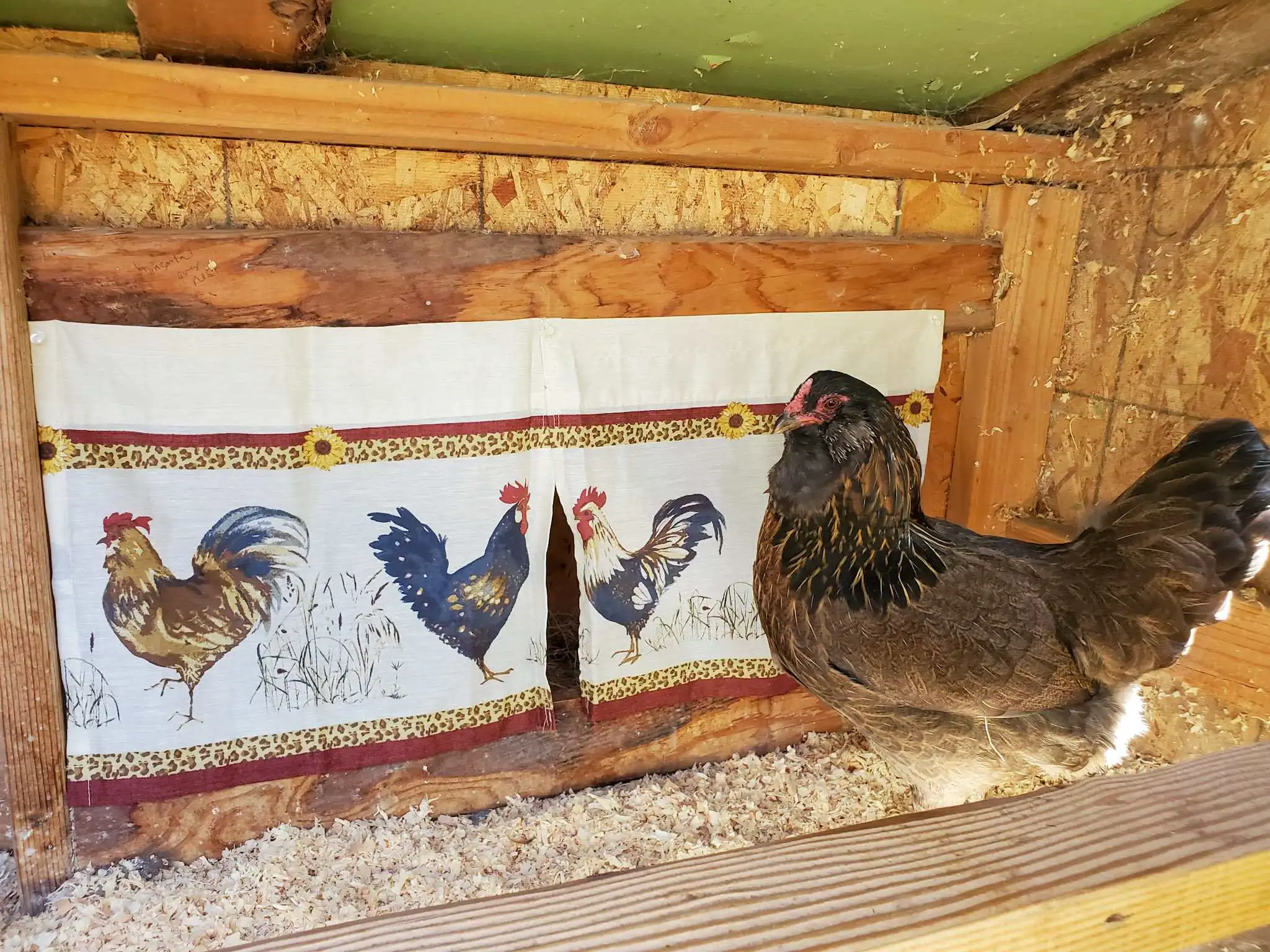
Since broody hens are persistent in staying at the place after laying their daily eggs, you can expect fights over the space, resulting in crushing eggs. Therefore, remove these hens from nesting boxes and free place for those laying eggs.
7. Often collect eggs
Regularly remove eggs from nesting boxes to prevent piling them up. Since most hens lay eggs by 10 AM, you should adjust your schedule and save the eggs before one of the chickens starts to break them and eat them. Collect eggs two to three times a day if you have a large flock.
8. Block access to the nesting box
Block the entrance to the nesting box where you have found broken egg traces. Changing the routine may force hens to forget about the pattern of egg eating before establishing the new habit.
9. Blowing eggs (fool the chicken)
Place golf balls or artificial eggs made of ceramic or wood in the nest. Since chicken beaks can’t break such a hard surface, they will give up on all the eggs in the nesting box.
Another way is to empty eggs and fill them with mustard and soap instead a real yolk and egg whites. It is a highly efficient way to train your hens since they hate both tastes.
10. Beak clipping
Some farmers resort to drastic methods such as clipping the hens’ beaks. You can trim the beak tips to make it impossible for chickens to break the eggshell but be careful not to hurt them and cause bleeding.
11. Isolation
When nothing else helps, the last method is to isolate the egg eater from other flock members.
Summary
There are numerous reasons why chickens start eating eggs. You can often break that bad habit, but it can sometimes be complicated and require applying serious strategies. As always, prevention is crucial, so you should feed your flock adequately and provide enough space and comfortable nesting boxes for hens.


